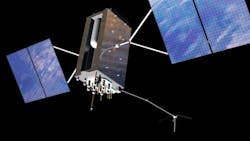SWrI develops trusted computing capability to test for GPS spoofing vulnerabilities in unmanned vehicles
SAN ANTONIO, Texas – Engineers from the Southwest Research Institute have developed a trusted computing system that can test for vulnerabilities in aircraft and unmanned vehicles that use GPS receivers for positioning, navigation, and timing (PNT). Aerospace Testing International reports. Continue reading original article
The Military & Aerospace Electronics take:
22 May 2019 -- “This is a legal way for us to improve the cyber resilience of autonomous vehicles by demonstrating a transmission of spoofed or manipulated GPS signals to allow for analysis of system responses," says Victor Murray, head of SwRI’s Cyber Physical Systems Group in the Intelligent Systems Division.
GPS spoofing is a malicious attack -- particularly dangerous for unmanned vehicles -- that broadcasts incorrect signals to deceive GPS receivers, while GPS manipulation modifies a real GPS signal. GPS satellites orbiting the Earth pinpoint physical locations of GPS receivers embedded in everything from smartphones to ground vehicles and aircraft.
SwRI designed the new tool to meet U.S. federal regulations. testing Testing for GPS vulnerabilities in a mobile environment had previously been difficult because federal law prohibits over-the-air re-transmission of GPS signals without prior authorization.
Related: GPS jamming is a growing threat to satellite navigation, positioning, and precision timing
Related: Air Force asks Raytheon to provide trusted computing to GPS with secure ASIC components
Related: GPS and eLoran timing receiver for navigation test and measurement introduced by Chronos
John Keller, chief editor
Military & Aerospace Electronics
